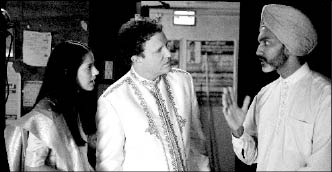Can't We All Just Laugh Along: Looking for Comedy in the Muslim World
by M. Faust

Before there was Larry David there was Albert Brooks, who has long been willing to take the part of a jerk in the interest of pursuing his comic and satirical goals. His persona is that of a guy you laugh at, not with, a concept that few performers want to embrace in a day when non-stop tabloid journalism has the effect of erasing the line between public performance and private character.
Looking for Comedy in the Muslim World, his seventh film as a writer-director, is a bit of a return to his 1970s form. Once again he uses his own name to play a Hollywood comedian and filmmaker, hired by the US government as part of a new initiative to try to understand the cultures of countries that are hostile to us. His assignment is to spend a month in India and Pakistan and write a 500-page report on what Muslims find funny.
That’s such a great idea that you can’t help but wish this were a real documentary, or a real government program. Barring that, it’s a pretty good premise for a comedy about American isolationism and xenophobia, which initially seems to be the direction that Brooks is taking it in.
Accompanied by government agents Stuart (John Carrol Lynch) and Mark (Jon Tenney), whose main function seems to be to explain that the lack of support he’s getting is typical of all government operations, Brooks rents an office in New Dehli, hires a secretary/translator, and sets about trying to fulfill his assignment. Stopping people in the street to interview them doesn’t work very well, especially when he identifies himself as being with the US government. Shocked to find that there are no comedy clubs in New Dehli (“Why would there be?” says his secretary), he decides to put on a stand-up show of his own for research. The show flops because Brooks’ material is about parodying the clichés of comedy, clichés that are unknown to his Indian viewers. (To be honest, this stuff may go over the heads of a lot of American viewers too.)
All things being equal, Looking for Comedy is a moderately funny movie. The best parts poke fun at Hollywood backbiting, especially an opening scene with Brooks auditioning for a role with director Penny Marshall (also playing herself). Ditto Brooks’ meeting with the Washington committee headed by actor/politician Fred Dalton Thompson, who mentions that Brooks was picked because “Our first two choices were working… As far as we can tell, you’re a pretty respected comedian.”
But all things aren’t equal. The original distributor of the movie dropped it because of its title, and they may not have been entirely wrong in doing so. Brooks’ fans understand that the point of his films is to mock the pretensions and tunnel vision of the character he plays; the people around him exist to react with incomprehension and shock to his ill-considered ideas. Viewers unfamiliar with that may feel that the films’ Muslims, by reacting in the same (entirely appropriate way) to Brooks, are being portrayed negatively. At the very least, we come away from the film thinking no differently about them when we went in (maybe even a little worse, given a poorly considered line in which an Iranian character talks about explosives training as if it were a standard course at Tehran Community College).
What Brooks needed, I think, was a scene in which Muslims are shown laughing at something simple and universal, like the hard-worked convicts laughing at cartoons in Preston Sturges’ Sullivan’s Travels. That could have left his character at the end of the film trying to take 500 pages to say “Muslims laugh at the same things we do,” rather than a labored satire showing the extreme damage he has unknowingly caused.
Brooks can’t be taken to task for the misunderstandings that exist among different cultures in the world today, and it seems obvious that he wanted in his own way to do something about them. (In an interview included with the press notes for the film, he says, “I don’t believe in this new era of conflict that the United States has done one-tenth what they should do on the cultural side. Trying to find out about other people; the idea that America is interested, that is intriguing.” He succeeded less at promoting cross-cultural understanding than at simply making a typically funny Albert Brooks movie, which hopefully will be taken for nothing more or less than that.
|
Issue Navigation> Issue Index > v5n3: Kerchung! You Lose! (1/19/06) > Film Reviews > Can't We All Just Laugh Along: Looking for Comedy in the Muslim World This Week's Issue • Artvoice Daily • Artvoice TV • Events Calendar • Classifieds |









 Current Issue
Current Issue